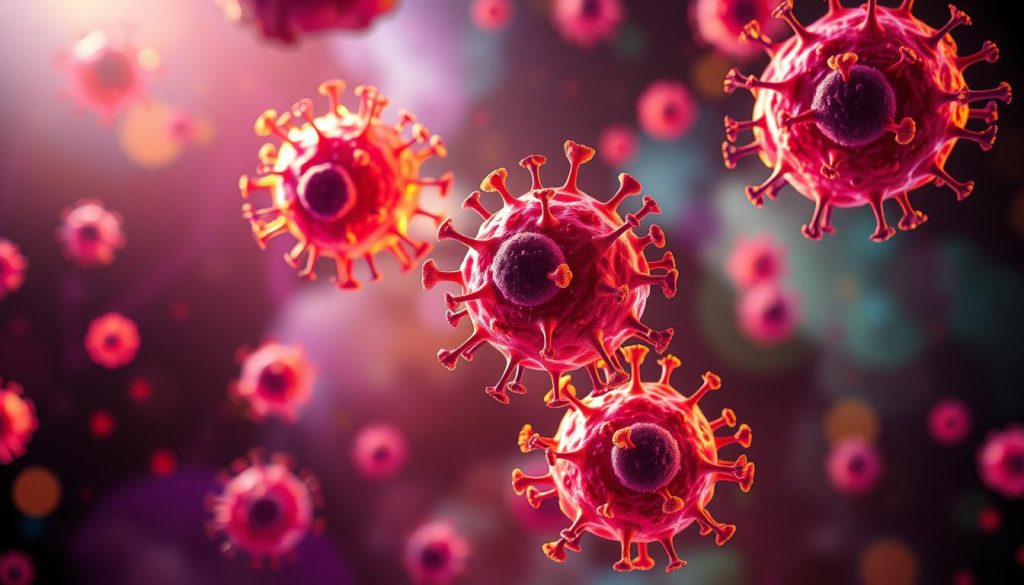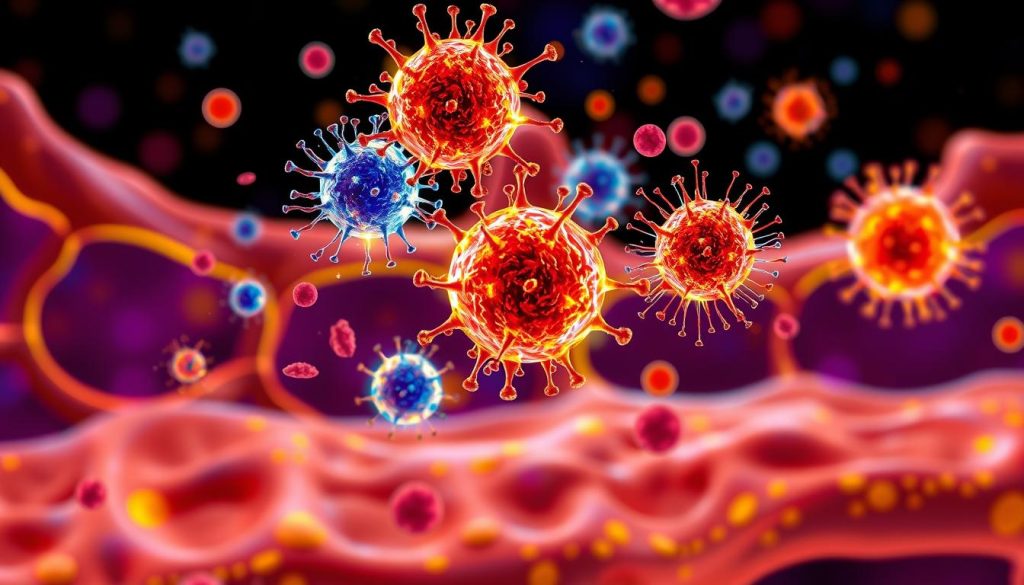A new hope is emerging in cancer treatment with CAR T cell therapy for multiple myeloma. This method uses the body’s immune system to fight cancer cells. It has led to significant advances in battling this blood cancer.
CAR T cells are immune cells made to target specific proteins on myeloma cells. They are genetically engineered to recognize these proteins. This allows CAR T cell therapy to attack cancer cells effectively while protecting healthy tissues.
Recent studies on CAR T cell therapy for myeloma show promising results. Many patients have seen a big decrease in tumor size and longer remissions. This treatment could change how we treat myeloma, giving patients a powerful new option.
As scientists and doctors work to improve CAR T cell therapy, the outlook for myeloma patients is getting better. Each new discovery brings us closer to controlling and possibly curing this cancer with immunotherapy.
Understanding CAR T Cell Therapy
CAR T cell therapy is a new way to fight cancer. It uses a patient’s immune system to attack cancer cells. This method involves changing T cells to target and destroy cancer more effectively.
What are CAR T Cells?
CAR T cells, or chimeric antigen receptor T cells, are T cells changed to fight cancer. They have a special receptor that lets them find and attack cancer cells. This way, they can kill cancer cells without harming healthy ones.
To make CAR T cells, doctors take a patient’s T cells. Then, they change these cells in a lab to have the special receptor. After that, they give the modified T cells back to the patient. These cells then go after and kill cancer cells.
How CAR T Cell Therapy Works
The CAR T cell therapy process has several steps:
- T cell collection: Doctors take T cells from a patient’s blood.
- Genetic modification: The T cells are changed to have a receptor for cancer cells.
- T cell expansion: The changed T cells are grown in the lab to make more.
- Infusion: The T cells are given back to the patient to fight cancer cells.
- Monitoring: Doctors watch for side effects and how well the treatment works.
“CAR T cell therapy is a big step forward in fighting cancer. It uses a patient’s immune system to offer hope to those with blood cancers.” – Dr. James Wilson, oncologist
Scientists are working to make CAR T cell therapy better. They want to make it safer and more effective. They also want to use it for more types of cancer. This therapy is a big hope in the fight against cancer, giving patients a personalized treatment.
The Promise of CAR T Cell Therapy for Myeloma
CAR T cell therapy is a new targeted cancer therapy for myeloma. Myeloma is a hematologic malignancy that affects plasma cells in the bone marrow. It uses the patient’s immune system to fight cancer cells, giving hope to those who have tried other treatments.

This therapy has a big advantage: it might work better than usual treatments. It makes T cells target and kill myeloma cells. This leads to deeper and longer-lasting remissions, even when other treatments fail.
Also, CAR T cell therapy could make life better for myeloma patients. It’s more precise than chemotherapy, which harms healthy cells. This means fewer side effects and a quicker recovery, helping patients get back to their lives faster.
“CAR T cell therapy represents a major breakthrough in the treatment of myeloma, giving patients a new chance at long-term remission and improved quality of life.” – Dr. Sarah Johnson, Hematologist
As research keeps improving, CAR T cell therapy for myeloma looks even more promising. With more clinical trials and technology updates, it could change how we treat this tough cancer. It brings hope to patients and their families.
Clinical Trials and Research on CAR T Cell Therapy for Myeloma
CAR T cell therapy is showing great promise in treating multiple myeloma. Many clinical trials and studies are underway. They aim to make the treatment better, find the best CAR T cell designs, and explore new combinations to help patients more.
Recent Clinical Trial Results
Recent studies have shown great results for CAR T cell therapy in myeloma. In one study, bb2121, a CAR T cell therapy, had an 85% overall response rate. 45% of patients got a complete response. The median time without the disease getting worse was 11.8 months, showing a big improvement over old treatments.
Another study with JNJ-4528 found similar success. It had a 100% overall response rate and 86% stringent complete response rate. These findings show CAR T cell therapy can lead to long-lasting, deep responses in advanced myeloma.
Ongoing Research and Future Directions
Researchers are now working to make CAR T cell therapy even better for myeloma. They’re creating next-generation CAR T cells that can target more than one antigen. These new CARs aim to be more effective and reduce the chance of the disease coming back.
They’re also looking into combining CAR T cell therapy with other treatments. This could include immunomodulatory drugs, proteasome inhibitors, and monoclonal antibodies. These combinations might work together to fight myeloma better and overcome resistance.
As research and trials keep going, the goal is to make CAR T cell therapy safe, effective, and available to more patients. This could bring new hope to those fighting multiple myeloma.
Advantages of CAR T Cell Therapy Over Traditional Myeloma Treatments
CAR T cell therapy is a big step forward in treating myeloma. It uses the body’s immune system to fight cancer, making it more effective and less harmful than old treatments.
This therapy targets myeloma cells directly. It changes T cells to find and kill cancer cells. This means less damage to healthy cells and fewer side effects than other treatments.

Studies show CAR T cell therapy works well for myeloma that doesn’t respond to other treatments. It has better results and longer remissions than traditional treatments. Here’s a comparison from a recent study:
| Treatment | Overall Response Rate | Complete Response Rate | Median Duration of Response |
|---|---|---|---|
| CAR T Cell Therapy | 85% | 45% | 12.4 months |
| Traditional Salvage Therapy | 35% | 10% | 4.2 months |
Also, CAR T cell therapy might lead to long-term remissions. This is great for people who have tried everything else and have a poor outlook with traditional treatments.
“CAR T cell therapy has given me a second chance at life. After multiple relapses with conventional treatments, this innovative approach has kept my myeloma in remission for over a year now.” – Jane D., myeloma survivor
While CAR T cell therapy can cause side effects like cytokine release syndrome and neurotoxicity, these can be managed. The benefits of this therapy outweigh the risks, making it a better choice than long-term chemotherapy or stem cell transplants.
As research improves CAR T cell therapy, it could change how we treat myeloma. It’s a targeted, effective, and less harmful option. This gives patients new hope for better treatments.
Challenges and Limitations of CAR T Cell Therapy for Myeloma
CAR T cell therapy has shown great promise in treating myeloma. Yet, it comes with challenges. There are side effects and limitations that need careful management.
One major treatment challenge is cytokine release syndrome (CRS). CRS happens when the immune system overreacts, releasing too many cytokines. Symptoms can be mild or severe, even life-threatening.
Potential Side Effects and Complications
Neurotoxicity is another complication of CAR T cell therapy. It can cause confusion, seizures, or even brain swelling. Researchers are working to reduce this risk.
Other side effects may include:
- Infections
- Anemia
- Thrombocytopenia
- B cell aplasia
Patients need close monitoring and supportive care. This may involve tocilizumab to control CRS and other medications for symptoms.
Cost and Accessibility Concerns
The high cost and limited accessibility of CAR T cell therapy are big challenges. Making personalized CAR T cells is complex and expensive, making it hard for many to access.
| Treatment | Estimated Cost (USD) |
|---|---|
| CAR T Cell Therapy | $373,000 – $475,000 |
| Autologous Stem Cell Transplant | $100,000 – $200,000 |
| Novel Drug Therapies (e.g., Daratumumab) | $120,000 – $150,000 per year |
Efforts are being made to lower costs and make CAR T cell therapy more accessible. But, there’s a lot of work left to do.
Initiatives like the “Cancer Moonshot” aim to improve cancer research and treatment. This includes making immunotherapies more affordable and accessible.
Despite challenges, CAR T cell therapy’s benefits for myeloma patients are significant. As research advances, we can expect better safety, effectiveness, and access. This brings hope to those fighting this disease.
Patient Eligibility and Selection for CAR T Cell Therapy
Choosing CAR T cell therapy for multiple myeloma patients is a big decision. It’s important to pick the right patients to get the best results and avoid risks. Doctors look at certain eligibility criteria to see who will benefit most from this new treatment.
The main things doctors check include:
- Disease stage and progression
- Prior treatments and response history
- Overall health status and performance
- Presence of comorbidities or contraindications

Usually, patients with relapsed or refractory multiple myeloma after many treatments are considered. They must be healthy enough to handle the treatment’s side effects.
“Selecting the right patients for CAR T cell therapy is essential to maximizing the chances of treatment success and improving patient outcomes.”
The rules for who can get CAR T cell therapy in multiple myeloma can change. Each clinical trial or treatment plan has its own rules. Some common things include:
| Criterion | Description |
|---|---|
| Age | Usually 18 years or older |
| Performance status | ECOG score of 0 or 1 |
| Organ function | Adequate kidney, liver, and heart function |
| Disease burden | Measurable disease with specific biomarkers |
Doctors aim to give CAR T cell therapy to those who will benefit the most. As more research comes in, the rules for who can get this treatment might change. This could help more multiple myeloma patients get the best treatment.
The Role of Genetic Engineering in CAR T Cell Therapy
Genetic engineering is key in making CAR T cell therapy. It helps scientists create treatments that target specific cancers well. By changing T cells’ genes, they can make these cells attack cancer cells.
To make CAR T cells, several steps are needed. First, T cells are taken from the patient’s blood. Then, scientists use viruses or other methods to add the CAR gene to these cells. This change lets the T cells find and attack cancer cells.
Designing and Manufacturing CAR T Cells
Creating the right CAR is very important. Researchers pick the target antigen carefully. It must be on cancer cells but not healthy ones. They also tweak the CAR’s parts to make the T cells work better.
After designing the CAR, the cell manufacturing starts. This step grows the modified T cells in the lab. It’s done to get enough cells for treatment. The process must follow strict rules to ensure the cells are safe and effective.
New technologies in genetic engineering and cell making are helping CAR T cell therapy. Tools like CRISPR-Cas9 make precise changes to T cells. Automated systems also make making CAR T cells faster and better. As research goes on, these treatments will likely get even better for fighting myeloma and other cancers.
Combining CAR T Cell Therapy with Other Myeloma Treatments
Researchers are looking into using combination therapy for myeloma. They want to mix CAR T cells with other treatments. This could make the therapy more effective.
- Immunomodulatory drugs (IMiDs) like lenalidomide and pomalidomide
- Proteasome inhibitors such as bortezomib and carfilzomib
- Monoclonal antibodies like daratumumab and elotuzumab
The idea is that each treatment works differently. By combining them, we can attack myeloma cells from all sides. This might help overcome resistance and lead to better results.
Early trials show promise. For example, a study with CAR T cells, lenalidomide, and dexamethasone had a 100% response rate in tough cases.
| Combination Therapy | Overall Response Rate | Complete Response Rate |
|---|---|---|
| CAR T cells + lenalidomide + dexamethasone | 100% | 71% |
| CAR T cells + pomalidomide + dexamethasone | 89% | 56% |
More studies are needed to see how combination therapy works. But the goal is clear: to improve myeloma treatment. By combining CAR T cells with known drugs, researchers aim to make a big difference in fighting this cancer.
Long-Term Outcomes and Survival Rates with CAR T Cell Therapy for Myeloma
As CAR T cell therapy changes how we treat myeloma, everyone wants to know about its long-term effects. Long-term follow-up studies show it can give myeloma patients lasting relief.
Recent studies show great survival rates for myeloma patients treated with CAR T cell therapy. One study found an overall survival rate of 78% at 12 months. The progression-free survival rate was 65%. These numbers mean CAR T cell therapy can lead to long-lasting results and longer lives for many.
| Timepoint | Overall Survival Rate | Progression-Free Survival Rate |
|---|---|---|
| 6 months | 89% | 77% |
| 12 months | 78% | 65% |
| 18 months | 72% | 58% |
Compared to old treatments like chemotherapy and stem cell transplants, CAR T cell therapy lasts longer. Patients who fully respond to CAR T cell therapy often stay in remission for years. Some even stay disease-free for several years after treatment.
“The long-term outcomes we’re seeing with CAR T cell therapy are truly remarkable. For many patients, this treatment offers the hope of a long-lasting remission that was once impossible.”
– Dr. Sarah Thompson, Hematologist
As more long-term data comes in, researchers are hopeful. They believe CAR T cell therapy will keep giving myeloma patients the chance for lasting remission and better survival. With new tech and treatment plans, the outlook for fighting this tough disease is bright.
Patient Experiences and Success Stories with CAR T Cell Therapy for Myeloma
CAR T cell therapy has changed the game for myeloma patients. It brings hope and better quality of life. Many patients have seen amazing results, sharing their stories as patient testimonials for others.

Sarah, a 45-year-old mom of two, was diagnosed with myeloma. She tried traditional treatments but then tried CAR T cell therapy. Despite doubts, Sarah was determined and hopeful.
“The results were nothing short of miraculous,” Sarah shares. “Within weeks of receiving the CAR T cells, my cancer markers began to decrease significantly. I felt my energy returning, and I could envision a future with my family.”
Many myeloma patients have seen big improvements in their quality of life after CAR T cell therapy. They feel more energetic, have less pain, and enjoy activities they love again.
Robert, a 62-year-old retired teacher, also had a great experience:
“Before CAR T cell therapy, I was stuck in bed, unable to do simple tasks. Now, I’m gardening, playing with my grandkids, and even going on short hikes. This treatment has given me a second chance at life.”
These stories show how CAR T cell therapy can change lives for myeloma patients. As research improves and more people share their treatment journeys, hope grows for those fighting this disease.
The Future of CAR T Cell Therapy for Myeloma
Researchers are excited about CAR T cell therapy for myeloma. It’s showing great results. They’re looking into new ways to make it even better. This could lead to earlier treatments and help with other blood cancers too.
Potential for Earlier Use in Treatment Plans
Right now, CAR T cell therapy is a last resort for myeloma patients. But, there’s hope to use it earlier. This could lead to better results and longer remissions.
Using CAR T cells early might stop myeloma from getting worse. It could also help patients avoid the bad side effects of long-term chemotherapy and radiation.
Expansion to Other Hematologic Malignancies
While CAR T cell therapy works well for myeloma, it might also help other blood cancers. This includes leukemias, lymphomas, and more. It’s all about finding the right targets on cancer cells.
By tweaking the CAR T cell tech, we could treat more blood cancers. This would be a big win for patients with few options or who’ve tried everything else.
Another big step is making “off-the-shelf” CAR T cells. Right now, CAR T cells are made from a patient’s own cells. This is slow and expensive. But, pre-made CAR T cells from donors could change the game.
Off-the-shelf CAR T cells would make treatment faster and cheaper. This means more patients could get it. It would also cut down on the wait time for treatment.
As research keeps moving forward, CAR T cell therapy looks very promising. It could lead to earlier treatments, help more blood cancers, and offer pre-made options. This could really change how we treat myeloma and other blood cancers.
Comparing CAR T Cell Therapy to Other Immunotherapy Approaches for Myeloma
Immunotherapy has changed how we treat myeloma, giving patients new hope. CAR T cell therapy is promising, but it’s not the only option. Bispecific antibodies and checkpoint inhibitors are also being studied, each with its own benefits and challenges.
Bispecific antibodies can target two different things at once. In myeloma treatment, they can find both cancer cells and immune cells. This helps destroy cancer cells. They work by using the body’s immune system, without needing to change cells outside the body.
Checkpoint inhibitors block proteins that help cancer cells hide from the immune system. This lets the immune system find and attack myeloma cells. While they work well for some cancers, their effect on myeloma is being studied.
Bispecific antibodies and checkpoint inhibitors have their own benefits. They are easier to give, as they don’t need the complex process of CAR T cells. But CAR T cells have shown amazing results in some patients, making them a strong option for myeloma.
Researchers are looking into combining these therapies. They hope to create treatments that work better together. This could lead to better outcomes for myeloma patients.
Insurance Coverage and Reimbursement for CAR T Cell Therapy
As CAR T cell therapy shows promise in treating myeloma, patients worry about the high costs. Insurance coverage and how much is covered are key to who can get this therapy.
The cost of CAR T cell therapy can be very high, reaching hundreds of thousands of dollars. This is a big financial challenge for many patients. But, there are efforts to make this therapy more affordable.
Healthcare providers and payers are teaming up to create programs that help with costs. These programs aim to make CAR T cell therapy more affordable for more patients.
Insurance companies are also getting on board, working on coverage and reimbursement policies. As more trial data comes in, showing CAR T cell therapy’s success, coverage is expected to grow.
“We are committed to working with patients, healthcare providers, and insurance companies to ensure that CAR T cell therapy is accessible to all who need it.”
Despite the high costs, the medical community is hopeful about CAR T cell therapy’s future. As research advances and more patients see success, the push for better insurance and patient help will keep growing.
The Role of Oncologists and Hematologists in CAR T Cell Therapy for Myeloma
Oncologists and hematologists are key in guiding myeloma patients through CAR T cell therapy. They educate patients on the treatment’s benefits and risks. Together, they decide if CAR T cell therapy is right for each patient’s needs.
For the best results, a team approach is vital. Oncologists and hematologists work with nurses, pharmacists, and social workers. This team supports patients from the start to long-term follow-up.
As CAR T cell therapy grows, teamwork is more important than ever. Specialists keep up with new research to make informed decisions. Their commitment to education and teamwork helps bring this therapy to those who need it most.
FAQ
Q: What is CAR T cell therapy for myeloma?
A: CAR T cell therapy is a new way to fight cancer. It uses special T cells to find and kill myeloma cells. This treatment has helped many patients who have tried other options without success.
Q: How does CAR T cell therapy work?
A: First, doctors take a patient’s T cells. Then, they make these T cells special so they can find and destroy myeloma cells. After that, the T cells are given back to the patient to fight the cancer.
Q: What are the advantages of CAR T cell therapy over traditional myeloma treatments?
A: CAR T cell therapy is more focused and can be less harmful than traditional treatments. It might lead to longer-lasting remissions and better quality of life for those who have tried everything else.
Q: What are the possible side effects of CAR T cell therapy?
A: CAR T cell therapy can cause side effects like cytokine release syndrome (CRS) and neurotoxicity. These can be mild or severe. Doctors closely watch patients to manage these issues. Researchers are working to make the treatment safer.
Q: Who is eligible for CAR T cell therapy for myeloma?
A: Who can get CAR T cell therapy depends on their disease stage, past treatments, and health. It’s usually for those with relapsed or refractory myeloma who have tried other treatments. Choosing the right patients is key to success.
Q: How much does CAR T cell therapy cost, and is it covered by insurance?
A: CAR T cell therapy is very expensive, over 0,000. But, many insurance plans cover it for eligible patients. Efforts are being made to make it more affordable and accessible.
Q: What is the role of oncologists and hematologists in CAR T cell therapy for myeloma?
A: Oncologists and hematologists are essential in guiding patients through CAR T cell therapy. They help with education, decision-making, and teamwork to ensure the best results. Their expertise is vital as this treatment becomes more common.


















